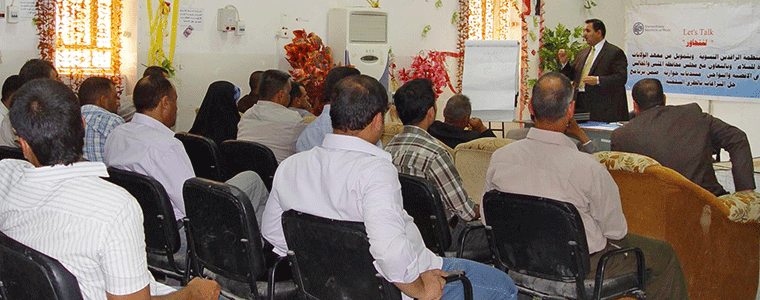In the summer of 2012, tensions rose between citizens and local authorities in Al-Muthanna Province, a largely tribal and conservative governorate in southwest Iraq. Frequent disputes over poor public services and funding for development projects, as well as corruption allegations, had stalled important initiatives such as a water-and-sewer upgrade and an effort to clear roads of trash. Similar frustrations had led to clashes, deaths and burning of government buildings in neighboring Wasit and Basra provinces.

Similarly, in Al-Muthanna Province, officials lacked an effective method to address citizens’ grievances, and exasperated residents began threatening elected provincial and appointed district council members with violence. So a local non-governmental organization (NGO) sought to prevent the tensions from escalating into violence, and intervened to mediate the conflict.
Supported by a USIP grant, the civic group, which is not being named for security reasons, conducted 25 community dialogue forums in 10 districts of Al-Muthanna. These sessions especially focused on rural districts, where tensions tend to be higher than urban areas because of land-ownership disputes. In each of these forums, citizens aired their priorities, needs, grievances and aspirations to members of the local and provincial councils.
The NGO helped establish joint voluntary committees in the 10 districts, each one comprised of tribal leaders or respected local figures and one district council representative, to work together on resolving issues. The NGO also facilitated the signing of memoranda of understanding (MoUs) between district councils and the respective committees to formalize the cooperation and clarify roles and responsibilities. The local committees became responsible for identifying and prioritizing the needs of residents in their areas, and helping address obstacles to the implementation of development projects.
Furthermore, the committees will attempt to mitigate the disruptive effects of tribal or land disputes on the development projects by attempting to resolve issues based on the law. According to the structures and processes outlined in the MoUs, the joint committees monitor community sentiment, evaluate development projects and make recommendations to the district councils. Although the ultimate executive power remains with the local councils, this arrangement greatly expands the opportunity of ordinary citizens to participate and collaborate on these projects.
The NGO team also conducted 10 public-education sessions on Law 21-2008. The law, previously unknown to many residents of the province, defines the roles and responsibilities of the provincial councils and their relationship to citizens and local council members. District councils are appointed by the elected provincial council, but under the law, local councils can function with minimum direction from the provincial board. This autonomy allows the district council to expedite projects as needed.
As a result of the NGO’s work with the support of USIP, seven developmental and public works projects were implemented on time and according to the community’s needs and desires. Additionally, the NGO team facilitated a public works project with the United Nations Mission in Iraq (UNAMI) that brought clean drinking water to two rural districts.
Perhaps the most lasting impact of the grant project is the creation of three new advisory positions on the local councils that will provide legal, technical and administrative expertise to the office of project planning at the provincial council in order to expedite future projects.
The NGO’s initiative helped prevent tensions from developing into violent confrontations. It also facilitated greater autonomy for local councils in designing and implementing projects and empowered ordinary Iraqi citizens to participate in the local governance of their province peacefully and within the law.



